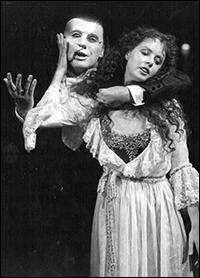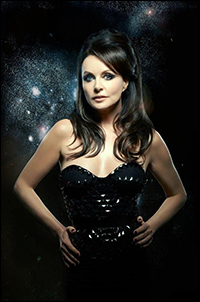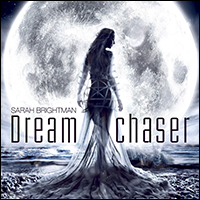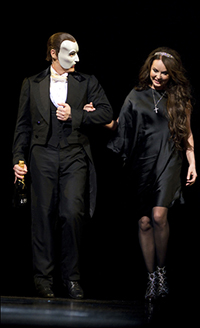
Sarah Brightman
Singer Sarah Brightman, who created the role of Christine Daae in the London and Broadway productions of The Phantom of the Opera, is about to embark on an extremely creative period that includes the release of her 11th studio album, the launch of an international concert tour that includes numerous U.S. engagements and continued training for travel into space that is now scheduled for sometime in 2015.
The CD, which is entitled "Dreamchaser," will be released April 16 and features Brightman's renditions of such songs as "Angel," "One Day Like This," "Breathe Me," "Ave Maria," "A Song of India" and "Venus and Mars," among others. The critically acclaimed soprano, whose tones seem to soar into the heavens, will then launch her latest concert tour, also entitled "Dreamchaser," June 14 in Taipei. Brightman will play over 40 cities, including a Sept. 21 performance at Radio City Music Hall in Manhattan. The tour, which will also be seen in Pennsylvania, Connecticut, Michigan, Illinois, Wisconsin, Ohio, Florida, Georgia, Texas, Massachusetts and more, will conclude Nov. 2 at the Theatre at the Honda Center in Anaheim, CA. Following the worldwide tour, Brightman will embark on what she has called "the greatest adventure I can imagine." The singing actress, who also appeared on Broadway in Andrew Lloyd Webber's Aspects of Love, will be part of a three-person team traveling to the International Space Station on board a Soyuz rocket, where she will orbit the earth 16 times daily and become the first professional musician to record a song from space.
Earlier this week, I had the pleasure of chatting with the gifted artist, who spoke about her numerous projects; my interview with the world's biggest-selling soprano, having sold over 30 million records, follows:
| |
 |
|
| Brightman, with Michael Crawford, in Phantom of the Opera. | ||
| photo by Clive Barda |
Sarah Brightman: I have! To be honest with you! [Laughs.] I wanted this all to be kept quiet, but it got leaked… I thought I'm just going to have to be honest and go for it… I was a child of the '60s. I was born in 1960, and space theory, especially in the last part of that time and going into the '70s, space was very relevant at that time. It was on television—all the experiments, the moon landings, everything like that. And, you know, as children growing up through that time, it was very much part of our lives—even down to products that were created and there were adverts on them [plus] the dramas on television… Patrick Moore, that was his time for all of the talking about the stars. It actually had a big effect on me, especially watching the first man on the moon. After that time, I thought about things differently, even as a child—and I think a lot of us did. And then, of course, things went very quiet in that area, and the idea of space exploration sort of, for everybody, disappeared for a very long time. It's only now that it's coming up again, especially with all the sub-orbital flights, which now people can all buy tickets for, and it's much more of a reality. So, I think subliminally, a lot of this does sort of stem from that time. Now that it's sort of become a reality, and it's something that, you know, might happen for me—and I say might because anything can happen between now and then, medically or whatever… It's been beautiful because it's an incredibly positive thing, and I've been very creative during the time. Some of the training I've done, and even the idea that it was a reality has, in many ways, helped me create and inspire me to do all the things that I normally do as a musician. It's very hard to pinpoint, but I'm trying to explain to you in the only way that I can about where it stems from. I think having talked to a lot of people, now I've ventured into this area, there are just some people who have a need and a real desire to go, and even to the reality that it's something that they are going to do, they're still very excited. There's no fear. It's almost like a need, and I'm one of those people.
| |
 |
|
| Sarah Brightman |
Brightman: Well, first of all, I had to go through a lot of medicals, and to tell you the truth, I was wary about going into it because, of course, they're very deep medicals, and you find out everything about your body because it has to be understood and known to see if you're fit for space travel, especially this type. And, just the thought that there might be something that I didn't want to know about for the future made me quite wary, but I decided to start. And, I sort of got through with—excuse the pun, flying colors—and I thought God, that's really lucky that I'm healthy. This started with medicals in Houston… I did some medicals in London, and the next set of medicals, which were really tough, were in Russia, and not only did I go through that part of it, but also through some of the physical training and things one might experience or would experience in space—centrifuge and high altitude chambers, rotating chairs—all the sorts of things that astronauts and cosmonauts are trained to do and go through. Also, a lot of psychological testing, and I was monitored through the night all the time. And, I got through everything, and I was told that I had done better in these tests than any spaceflight participant had so far, so I was very relieved about that. That's been the first part of it. And, the next part is sort of before you go outwards… I think it's about six-eight months of pure training up in Star City in Russia. That's basically all I can tell you so far! [Laughs.]
Question: It's going to be a ten-day travel, right?
Brightman: Eight-ten, yes.
Question: And, you're planning to sing in space…
Brightman: Well, everybody goes up and does something in the private sector that they feel that they can do, and obviously I'm a musician and feel that one of my experiments—because I think there are many that you can do and that you're helped with the ideas of what you could do—yes, would be to see how I would sing in zero gravity. I've been told by another cosmonaut that it is entirely possible. There is, however—if you want to connect with earth, there's about a two-second delay, so that would have to be worked out if I wanted to connect with musicians or connect with concerts that are down on earth—as I'm flying over all this—depending on trajectory.
Question: Do you have an idea what song you might want to sing first in space?
Brightman: I don't at the moment. I've got a lot of things, which sort of come before deciding something like that, but it will be very beautiful to try and find the right piece to actually do from there and connect with the earth, but I've got some time.
| |
 |
|
| Cover art |
Brightman: Yes, I do. It's called "Dreamchaser," and it's beautiful. It's been inspired by sort of my love for space and the universe and our planet. I'm an interpreter of music. Most of the songs are covers of pieces, but they're pieces which are very expansive and very beautiful. They go from old to sort of totally contemporary pieces, and we had to create a beautiful scape—music scape, if you like—to try and give people the feeling of space and the universe and something more expansive and deeper meanings. From what people have told me from listening to the album, everyone's going, "Wow, this is probably one of your best pieces of work to date." Obviously, it depends on people's taste; we're all different. But I have to say, it's something that I got very deeply into and was very involved with, and I've been working with a wonderful producer called Mike Hedges, who is known for doing many things. To name a couple, he's worked a lot with U2 as a producer and engineer and also The Cure as well as doing a lot of classical music—he's a very spiritual man, and he felt the right person to do a project like this. So, that's what it is. It's called "Dreamchaser" because I've always been a person who has chased my dreams. Some I've achieved, some I haven't. But a journey onto a dream is the most beautiful thing and lands you in directions and areas that you couldn't even imagine, so that's why I called it "Dreamchaser." And, coincidentally, there is a new spaceship being built—one of the three that will hopefully be carrying astronauts to the space station in the future—and that's actually called Dreamchaser as well, so that's nice. [Laughs.] So, yes, it's been an absolutely gorgeous project to work on, and if you think about the universe, it gives one artistically so much scope to work with and brings so many textures and ideas and thoughts. It's been great for a soprano, I have to say.
| |
 |
|
| Hugh Panaro and Sarah Brightman onstage at Phantom of the Opera's 25th anniversary performance. | ||
| Photo by Monica Simoes |
Brightman: It ranges from pieces by Sigur Rós. I don't know if you know the group—Sigur Rós—but they're an Icelandic group. Their work, when you listen to it, it has a very expansive sound. It's one of the reasons I chose to do the pieces… Also "A Song of India," which, of course, is a beautiful classical piece that many, many people know and has been done many times. It has a huge range of pieces in there, so it's been great to work in that way. I've given myself a lot of freedom as usual and dared to go where no others had dared. [Laughs.] It's been fun. I think that the passion in it really shows in the album, so a public, hopefully, that likes my work will subliminally pick up on that.
Question: Recently, Phantom of the Opera celebrated 25 years on Broadway. I wonder, what does it mean to you to have been part of both the London and the Broadway companies of what's one of the most successful musicals ever?
Brightman: Oh, it's a beautiful thing. All artists hope, because we obviously put so much passion into what we do with the characters and everything, to see something go onwards that we've been part of the creation. [It's] just the most wonderful thing. You know, I played the part of Christine, and I'm told I was the muse of it and the idea of the musical happening, and for me to see all the new Christines come up and enjoy the part—even now, all of this time later—is just a great thing. You feel you've done something good in life—you did something—and it's nice. I'm very, very grateful that I've been that person.
Question: At that time in your career, you had done a lot of musical theatre, and then you did Aspects of Love. Was it a conscious decision to move away from theatre or did that happen because other opportunities came about for you?
Brightman: No, opportunities didn't really come for me… What happened was I did make a very conscious decision. I love Andrew's work…[but] I hadn't thought of doing musical theatre, although I'd trained in that area in the arts from a young age upwards… I got into musical theatre because the audition [for Cats] came up, and it was an Andrew Lloyd Webber piece, and I thought, "This looks really, really great. I'm going to try for it." It took me into a path I wasn't expecting, and I enjoyed it at the time… I had done a couple of pieces that weren't Andrew's work, and although I liked doing them, I didn't feel like I was really achieving… I didn't feel good within that [medium], so I decided to go it alone and have a solo career, and it's been wonderful. I've recorded all the things I've been wanting to and have worked in arenas and different kind of places all over the world and had a fabulous career in another way for a while. You know, I hold very dear that time. It was an amazing time for me and incredibly creative, but it sort of couldn't blend. I've gone off to do just different things, which I think is always healthy in an artist's life if you're able to do that.
Question: Do you have any concerts planned for the U.S.?
Brightman: Yes, I'm starting a world tour with the "Dreamchaser" tour, actually in China in June, and I'm doing Japan, and also Korea, and I coming here to the United States with the same tour—well, part of the tour—in September until the end of the year. Canada and Mexico, also.
[For a complete list of tour dates, click here.] Well, that's all for now. Happy diva-watching! E-mail questions or comments to [email protected].









